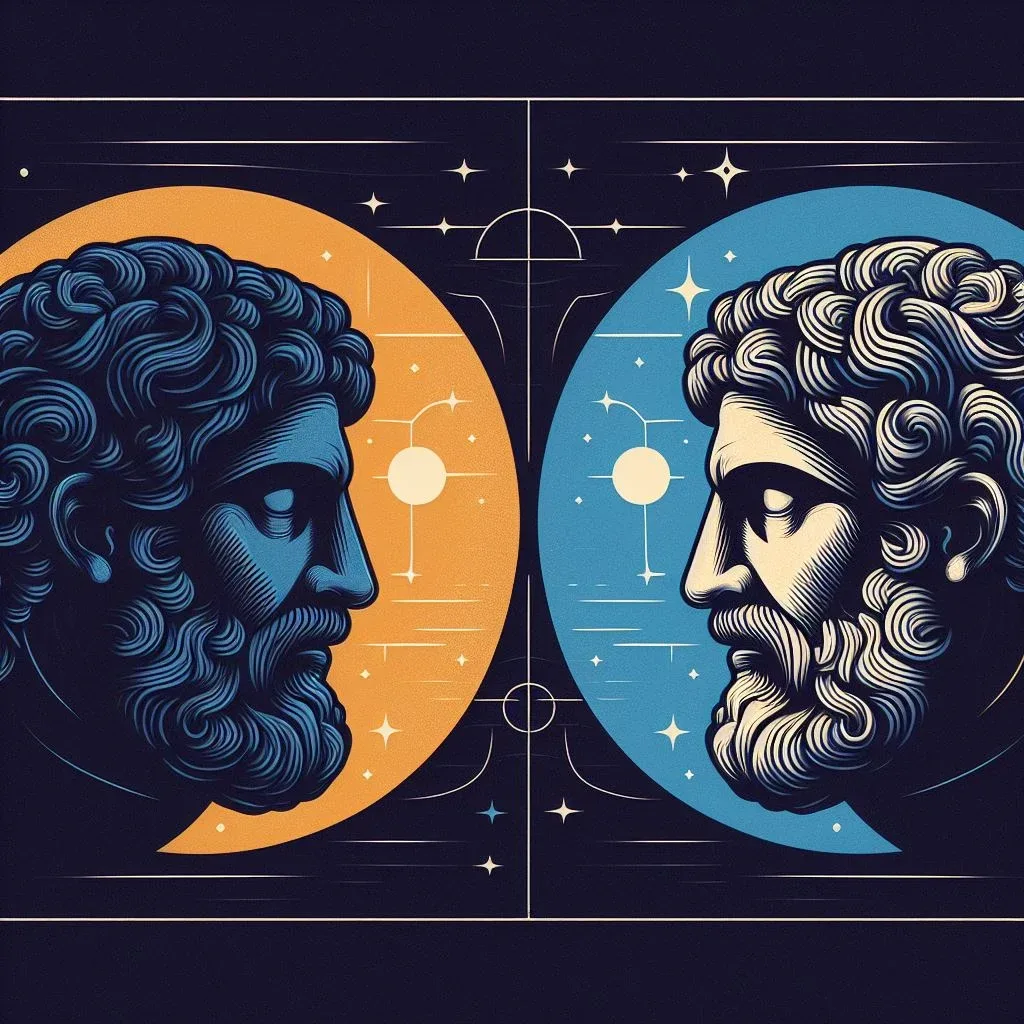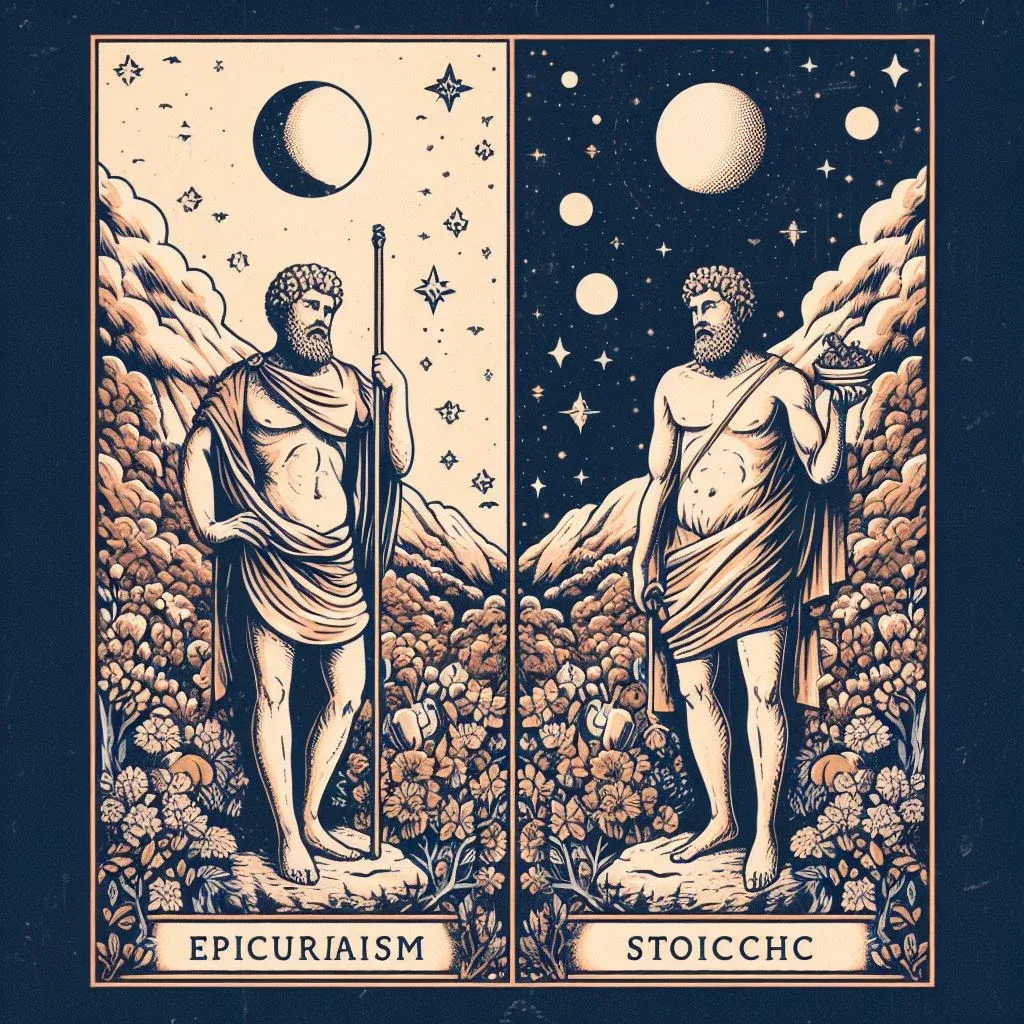In the broad landscape of ancient philosophies, Epicureanism and Stoicism emerge as two distinct schools of thought, each offering a unique approach to the pursuit of a life well lived. In this blog post, we will explore a fundamental similarity and difference between Epicureanism and Stoicism, highlighting the areas where these philosophies align and where they diverge.

Epicureanism: In Search of Moderate Pleasure

Similarity: The Search for Attention to Emotions
Both Epicureanism and Stoicism value attention to human emotions. Epicureans believed that the pursuit of pleasure, although often associated with hedonism, should be directed toward moderate pleasures that provide peace and tranquility. Attention to emotions is a quest shared by both philosophies, although with different approaches.
Stoicism: In Search of Virtue and Serenity

Difference: Approach to Emotions
The fundamental difference between Epicureanism and Stoicism lies in their approach to emotions. While Epicureanism seeks moderate pleasure, Stoicism emphasizes emotional serenity and virtue. Stoics believe that virtue is the highest good and that we should seek self-discipline to control our emotions rather than seeking pleasure.
Similarities and Differences in Practice

Similarities in the Search for Tranquility
Both philosophies seek a form of tranquility and inner peace. Epicureans believe that moderate pleasure leads to this tranquility, while Stoics see self-discipline and calm acceptance as the path to achieving this state.
Differences in the Purpose of Life
The biggest difference between the two philosophies is the purpose of life. For Epicureans, the pursuit of pleasure is the central objective, as long as it is moderate. Stoics, on the other hand, believe that the goal is to live a virtuous life, seeking wisdom and controlling emotions.
Conclusion: Understanding the Philosophies of Epicureanism and Stoicism
Epicureanism and Stoicism represent two contrasting approaches to the pursuit of a meaningful life. While both value paying attention to emotions and seeking tranquility, the fundamental difference lies in the purpose of life. Epicureans seek moderate pleasure, while Stoics seek virtue and emotional serenity. Understanding these similarities and differences helps enrich our appreciation of the nuances of ancient philosophies and choose the approach that most resonates with us in our quest for a life well-lived.
FAQ: Similarity and Difference Between Epicureanism and Stoicism

Here are some of the frequently asked questions about the similarity and difference between Epicureanism and Stoicism.
1. What is Epicureanism?
Epicureanism is an ancient philosophy that values the pursuit of moderate pleasure as a path to tranquility and satisfaction in life.
2. What is stoicism?
Stoicism is an ancient philosophy which emphasizes the pursuit of virtue, self-discipline and emotional serenity as a path to a life well lived.
3. What is the similarity between Epicureanism and Stoicism?
A significant similarity between Epicureanism and Stoicism is the value of paying attention to human emotions and the search for tranquility and inner peace.
4. What is the fundamental difference between Epicureanism and Stoicism?
The fundamental difference between these philosophies is their approach to emotions. Epicureanism seeks moderate pleasure as its goal, while Stoicism emphasizes the pursuit of virtue, self-discipline, and emotional control.
5. How did the Epicureans view the purpose of life?
Epicureans see the purpose of life in the pursuit of moderate pleasure, as long as it leads to tranquility and the absence of pain.
6. How do the Stoics view the purpose of life?
Stoics see the purpose of life in the pursuit of virtue, wisdom and emotional serenity, believing that pleasure should not be the main objective.
7. Can I apply elements of both philosophies in my life?
Yes, many people choose to incorporate elements of both Epicureanism and Stoicism into their lives, seeking a balance between moderate pleasure and virtue.
8. Which philosophy is best for me?
The choice between Epicureanism and Stoicism depends on your personal preferences and values. Some people may find aspects of both philosophies that resonate with them, while others may identify more strongly with one of them. The important thing is to choose the approach that best aligns with your personal goals and values.





